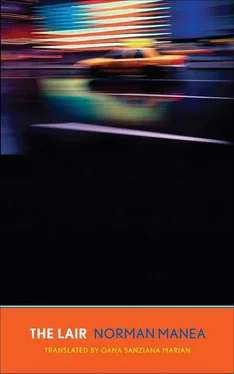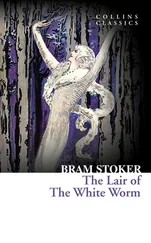Gora was preparing his questions, in his mind, but Avakian didn’t allow any pause.
“Should I keep him talking about things that he knows? Should I try to steel him up? This wasn’t a time for conventional solutions.”
President Avakian was laughing heartily, happy that he’d beaten Death.
“You know that Ga  par, as a man, is quite …”
par, as a man, is quite …”
“Miraculous! You mean miraculous? He’s a miracle, no more, no less. I escaped with my life only through a miracle. He didn’t care at all. About me, about himself, about the car, New York, it was all just a spectacle, that’s all. The spectacle before the catastrophe, and the spectacle of the catastrophe.”
The historian couldn’t forget that experiment, and wouldn’t allow himself to be interrupted from recounting the morbid screenplay, which he’d probably already recounted many times over.
“The business card he gave you represented …”
“A letter of thanks! A reward. He was about to hand it over, the next occasion, to his boss: Death. A cash reward, no matter how big, would have been merely trivial.”
“You’d be disposed to see him again, then? To … ”
“To see him again? As a pedestrian … as a pedestrian, Mr. Gora! As a pedestrian, anytime! Disposed? Obligated! That’s how I see it. A matter of conscience, I can’t forget that. A miracle can’t be repaid in any other way.”
No one could have pleaded Peter’s cause better than Bedros Avakian himself. There was nothing to add; you simply had to let him exhaust his inexhaustible discourse.
“I was, you understand, in the heart of Experimental Theater.. Experimental History. The great experiment of the other world. Martyr and guinea pig. In less than a half an hour, death had kissed me everywhere. I was powerless. But I escaped, after all! The madman at the wheel has no escape, however, that’s for sure! Now or in an hour or tomorrow, the holocaust, an atomic bomb, a worldwide earthquake, or a cosmic hurricane will meet him. That’s certain! Should I call the police or the taxi company, or should I hire him instantly at the university? You know how people are, always in a hurry — I was in a hurry to arrive in London, at a conference about the Armenian genocide in Turkey, I was presiding over the conference. Not even after I eluded death did I forget that I didn’t have time to spare, I needed to get to London. And I did.”
“So, then, Ga  par could … I wonder if he might call you,” Gora ventured to say. “He kept your card, this I know. I could, eventually …”
par could … I wonder if he might call you,” Gora ventured to say. “He kept your card, this I know. I could, eventually …”
“If he’s alive! If he’s still alive. If the miracle revalidated itself. It would be beyond my understanding, as well as the understanding of any rational being. I’d do anything, Professor, for such an intangible being, anything. I’ll hire him to teach the occult! Spells and magic and astrology?”
Dr. Avakian was laughing, quite pleased with himself. At the height of his frenzied monologue, probably to perfect the dark humor of the incident, he asked for a letter of recommendation for Peter Ga  par.
par.
In the folder on Gora’s desk, there was a heap of documents related to Peter. Yellow, white, blue sheets; Gora liked to jot notes quickly, on colored paper, details, whether real or imagined, thoughts, information that might someday be useful to him. He collaborated, under a pen name, with the journals of the exiles; he also wrote brief, ironic obituaries. He prepared them carefully, while the dead were still alive. Then he would thin out the compositions, without giving them up all together. The passages seemed too short, as the results of such extended research. How to make a simple, ephemeral inscription out of a biography that accumulates and burns through so much? A cynical frivolity, a bow in the face of unavoidable ferocity.
The deceased deserved more than the bureaucratic summary of visible existence! One should capture not just what was, but also what could have been, the potentialities that dissipate at once with the deceased. What he endeavored only in his mind, what he sketched out only in thought but never brought to fruition or had the courage to admit, even to himself. The secret life, often unconscious, surrounding and stemming from the heart of the ephemeral, time and space extended beyond the immediate present.
This was the start of Professor Gora’s gradual dedication to a laborious project.
The file on Peter Ga  par RA 0298 didn’t begin immediately following the conversation with Avakian. Gora preferred small deferments: if in two weeks Peter is still alive, then, yes, he will be honored with the yellow folder that he very much deserved.
par RA 0298 didn’t begin immediately following the conversation with Avakian. Gora preferred small deferments: if in two weeks Peter is still alive, then, yes, he will be honored with the yellow folder that he very much deserved.
The first notes were older accounts, then the conversation with the historian Avakian. There was also, already, the copy of the letter of recommendation that he sent to Avakian.
It didn’t suffice to say that Peter Ga  par had been, in a superrealist country, the author of a minor work (because it was a parody) and an unknown masterpiece (because he never wrote it) adored by a gallery of admirers. The work existed while the literary cafe intelligentsia said it existed, but couldn’t be proven to exist, and perhaps this wasn’t even necessary. Ga
par had been, in a superrealist country, the author of a minor work (because it was a parody) and an unknown masterpiece (because he never wrote it) adored by a gallery of admirers. The work existed while the literary cafe intelligentsia said it existed, but couldn’t be proven to exist, and perhaps this wasn’t even necessary. Ga  par’s bylines about sports and shows and philatelic exhibits and horseraces were worth mentioning only in the obituary, but not in the letter. Gora underscored Peter’s lucidity in hard times and even slipped in a wave of sympathy for Ludmila’s bewildered cousin, referring to that first encounter when the chauffeur had attempted to bring Avakian to the Other World instead of to John F. Kennedy airport. He didn’t forget to include a paragraph about Gaspar’s parents, survivors of the most infamous of all the Nazi concentration camps, a chapter that the son — a survivor of socialism — refused to discuss. As president of the Conference on the Armenian Genocide, Avakian was certain to be sensitive to such a detail. He mentioned, finally, the intellectual and pedagogic potential of the immigrant.
par’s bylines about sports and shows and philatelic exhibits and horseraces were worth mentioning only in the obituary, but not in the letter. Gora underscored Peter’s lucidity in hard times and even slipped in a wave of sympathy for Ludmila’s bewildered cousin, referring to that first encounter when the chauffeur had attempted to bring Avakian to the Other World instead of to John F. Kennedy airport. He didn’t forget to include a paragraph about Gaspar’s parents, survivors of the most infamous of all the Nazi concentration camps, a chapter that the son — a survivor of socialism — refused to discuss. As president of the Conference on the Armenian Genocide, Avakian was certain to be sensitive to such a detail. He mentioned, finally, the intellectual and pedagogic potential of the immigrant.
Once out of the hospital, Peter found himself unemployed. He inspected the business card of his partner in the race of death. There was no point in calling, he wouldn’t be able to access the celebrity. He consulted the train timetables; he’d arrived in the idyllic mountain setting and the college run by the ancient European historian.
While he waited to be received, the secretary informed him that the president wasn’t just a historian but also an authority called to testify in scandalous human rights violations cases, and a translator of ancient Greek.
“America!” Peter bumbled ecstatically. Universities hidden in the woods, like in the Middle Ages. University professors ready for adventure! Historians who plead in famous cases, musician chemists, psychologist bankers, athlete film directors, mathematicians blocking the mise-en-scene, actors turned senators, governors, presidents.
“The baroque? The baroque was your thesis? The baroque and the Dadaist derivation, you say? Fine, just fine. I’d like to hire you on this subject. But I can’t. Be a little more modest. Something else. Something else?”
The candidate was silent; his imagination balked.
“Something else. Something more exotic. Less academic. We have a lot of American literature doctors. As historians, I admit. Something more exotic, another subject?”
Читать дальше

 par, as a man, is quite …”
par, as a man, is quite …”










